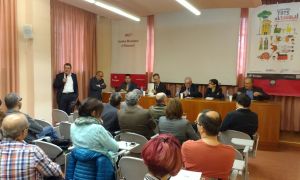The last session "The mobility of young VET: an opportunity to access the work; an improvement factor of competitiveness" has been held in Tarragona. The meeting was part of a project of the Catalonia Europe Foundation developed to facilitate the mobility of European students in vocational training. Its first meetings were held in Barcelona and Girona, and the Foundation website hosts an Observatory on mobility in VET. The speakers, gathered last Friday at the Municipal Institute of Education of the City of Tarragona, have identified the main obstacles to the development of European mobility in vocational training. Some of them are the lack of a range of exchange programs; lack of resources on the part of schools that want to participate; language learning; and the need to prepare teachers to manage the exchange programs.
The session started with the speech of Francesc Roca, councilor of the Department of Education, Employment and Development of the Municipality of Tarragona. Then Ernest Maragall, MEP who was rapporteur of the mobility programme approved by the European parliament the last week, has introduced the speakers: Estanislau Vidal-Folch, Deputy Director General of Programmes Education Innovation and the Department of Education; Marta Gutierrez, Programme Manager of the Erasmus + Programme Coordination Unit and National Agencies Managament, as a representative of the Commission; Joel Bonamy, representing the Fondation the Regions européens pour la recherche, l’éducation et la formation (FREREF); Xavi Favà, head of human resources Repsol Tarragona. The event was supported by the European Commission, with the support of the Tarragona Municipal Institute of Education.
Estanislau Vidal-Folch explained that "here is a lack of strategies in mobility and too much bureaucracy in managing processes. At the same time, there is a lack supply of mobility sites. Often the demand exceeds supply". He added that "the department of Education has a mandate to encourage mobility". Vidal-Folch announced that the Catalan Government has offered to host the next work meeting on mobility grants. He announced it will probably be will held "the coming september".
Joel Bonamy, FREREF representative, pointed out the main difficulties VET students, when getting involved in mobility programmes: their socio-economic status; the size of schools compared to universities; lack of tools on the part of teachers; language skills... However, Bonamy emphasized that "for young people who have lived international stages this experience goes far beyond the professional skills they acquired".
On behalf of the Commission, Marta Gutiérrez has offered practical information to representatives of centers on the calls included in the Erasmus+ programme. He emphasized the need to identify the training needs of businesses, integrating the professional sector. "We need that best matches what the market demands of work with what is offered in the schools."
As a company representative, Xavi Favà, head of human resources Repsol YPF Tarragona pointed out that "today, the only thing that can differentiate from our competitors is the human quality of the people, their values and skills, mobility will be a key part of of this paradigm".
Maragall concluded the meeting, claiming that Europe needs to be conscious about the relationship between education and work. "Everyone is clear that mobility means more employability. It is a fact proven by experience, fully measurable in terms of efficiency". In his opinion Europe needs more Europe, resulting in more Commission; enhancing the identification of problems and solutions; and creating a common framework involving greater efficiency. The MEP asked for the involvement of municipalities, training centers and companies, as a way to achieve the efforts that will be required to promote maximum reliability in training. It also stressed the need for "preparation of teachers in vocational probably have to do a tutorial paper stronger than might might need in the university". Other points are essential to advance the access of students to offer FP Erasmus: recognition of the experience acquired outside the school; adaptation of skills and abilities to the demand; the expansion of training programmes; the establishment o a common framework in curricula...
Coinciding with the vote of a report to the European Parliament to promote mobility in the field of training last week, Maragall, along with other MEPs Catalans and Basques, introduced an amendment calling for the information on the Erasmus+ programme to be published in the communication language of each region. This would include Catalan and Basque languages. The amendment was not admitted to the negative vote of European Socialists and popular. Maragall regretted "the amendment to the documentation of the Erasmus + in Catalan should be natural. His spirit was to improve its dissemination".











